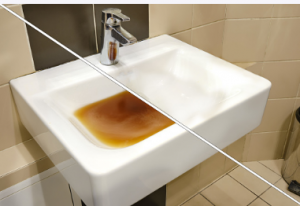There are many ways to unblock blocked drains, including DIY techniques. However, DIY methods can leave you with a much bigger mess than when you started. It is best to contact a plumber for help if you have any doubts about your ability to do it yourself. Also, make sure you wear the right safety gear, such as rubber gloves, to protect your skin from the chemicals you will use. If you’re unsure what to do, read more about some of the most common drain cleaning solutions below.
 Before starting your next task, be sure to rinse the mixture with plenty of hot water. This method is ideal for clogged sinks and toilets, as it will not result in a foul odour. Depending on the cause of the blockage, this mixture will work for any drain. Consult with distinctplumbing.com.au/blocked-drains-and-repairs.
Before starting your next task, be sure to rinse the mixture with plenty of hot water. This method is ideal for clogged sinks and toilets, as it will not result in a foul odour. Depending on the cause of the blockage, this mixture will work for any drain. Consult with distinctplumbing.com.au/blocked-drains-and-repairs.
Another effective drain cleaning solution is a wet & dry shop vacuum. Make sure that it is set to remove liquids. Make sure to cover the machine with a sheet or a piece of plastic to minimise mess. Then, insert the wet & dry shop vacuum into the drain and seal it properly. If this solution doesn’t work, you can adapt an old plunger head to unclog your drain. Once the mixture is dry, you can use boiling water to flush the solution down the drain. If the blocked drain is severe, you might have to repeat this method several times.
Blocked drains are one of the most common household problems. They can happen unannounced or during everyday tasks. Whatever the cause, they can be very frustrating and even downright disgusting. In addition, the bacteria that collect in clogged drains can cause a wide variety of health problems. It is also possible that an object or a hair may accidentally get into the drain, causing a gunk buildup. The good news is that the solution is inexpensive. Consult with distinctplumbing.com.au/blocked-drains-and-repairs.
Foreign objects can also cause blocked drains. Foreign objects can include cotton pads, baby wipes, and sanitary items. Also, electronic waste can get caught in drains. Ensure to dispose of these items properly. These tips will keep your drains unclogged and keep you and your family safe. Before you do anything, don’t forget to take the time to avoid these things altogether. You’ll be glad you did. You’ll be amazed at how easily you can prevent blocked drains.
If you don’t feel confident enough to use a plunger, you can purchase a chemical drain-clearing preparation sold at most hardware stores and supermarkets. The chemical drain cleaner should be left to work for several hours overnight. This method has been used to unclog blocked drains for decades. If you are unsure about using it, remember to wear gloves and stay in a well-ventilated room.
Blocked drains are inconvenient, but they can also be a serious problem. Not only is water foul-smelling, but it can also lead to electrical problems if left untreated. To avoid this from happening to you, consider installing a sink strainer. These filters are made from mesh, metal, or silicone. These devices allow only water to pass through them, so larger items cannot enter the drainage system. These filters also prevent food, paper, and other larger items from becoming trapped and clogged.
If plungers are not working, a drain snake is a flexible drill that will help clear clogs in drains. A plumber’s snake will work on a clog more force than plungers. To use a drain snake, you need to push it into the blockage until it becomes stiff and reaches the bottom of the pipe. Then, it would be best if you flushed the pipe with more hot water. Another good way to clear blocked drains is to use baking soda and salt. The two substances combine to form a strong chemical reaction so that they can be used in a one-to-one ratio. It would be best to allow the mixture to sit for several hours before flushing the pipe with water. Consult with distinctplumbing.com.au/blocked-drains-and-repairs.